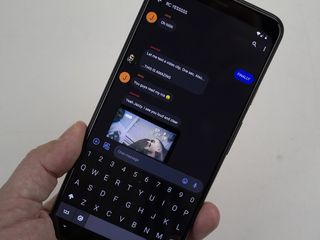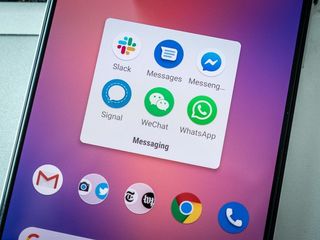It's not your duty to suffer through the early days of RCS — just use another messaging app

The Android enthusiast community is stoked about RCS messaging. Being excited about a new messaging protocol is the exact kind of thing Android nerds would get excited about, and the fact that it's generally being positioned as a new unified messaging platform to be "iMessage for Android" has elevated its appeal.
But sadly, RCS continues to have a rocky rollout. Carriers are dragging their feet in supporting it, as are phone makers — and while the latter can be addressed with a third-party messaging app, there's little you can do about the former. Cross-carrier (to say nothing of cross-country) RCS support is a mixed bag, and in some cases they're forming messaging alliances on the side to muddy the waters further.
RCS isn't ready for prime time yet, and you don't have to use it until it is.
With all of the tumult surrounding the rollout of RCS, I just don't understand why so many people are so enthusiastic about using it right now. At this point, you have to work to get RCS. There's a "hack" (of sorts) to enable it on any phone, but that's not guaranteed to stick around forever — or even long enough for carriers and phone makers to actually support it properly. Outside of that you need to be using a specific app and only certain carriers — and that goes for everyone you talk to. Having to think about apps and carriers and protocols is exactly the problem RCS is aiming to solve — yet you have to deal with it all to use RCS right now.
It's not my duty as a messaging app user to be the one to die on the RCS hill. There is zero reason for me to keep trying to rely on RCS as it's rolling out and clearly in an unfinished state. A messaging app means nothing if the people you talk to most often aren't on it — or willing to switch to a new platform that supports it. And with all of the caveats involved with RCS right now, you aren't going to be finding all of your friends and family jumping through hoops to start chatting with you using RCS.

Then, there's the Apple situation. As our own Joe Maring astutely points out, RCS really can't fully "catch on" until Apple supports it. There are few people who live in a world where they don't speak to a single person with an iPhone — and there's a good chance a lot of people you regularly talk to have one. So even in the most optimistic case, where every person in your life with an Android phone has RCS, you're still facing a bifurcated experience of getting improved RCS chat with those Android users and "regular" SMS with the iPhone users. You can't win even in an ideal world where the RCS dream on Android is fully realized — so why are you so enthusiastic to use it right now when it's mostly broken?
Why are you so enthusiastic to use RCS when it's mostly broken?
But if we're going to talk hypotheticals here, there's a chance that you can find a single chat app that works with everyone. Maybe that's WhatsApp, Telegram, WeChat, Line, Facebook Messenger, GroupMe, Hangouts or a dozen others. Yes I'll admit it's rather optimistic to think you could get everyone you talk to regularly on a single chat app — but right now, it's impossible to get everyone using RCS, no matter what you do. So why force yourself to use RCS, dealing with the struggles of incompatibility, incomplete feature sets and explaining to everyone what to do to get it at this point? It just isn't worth it right now. Not when there are great chat apps that work well, have the features you want, and are available cross-platform.
We've all experienced different versions of messaging platform frustration, and for many of us, it's to the point where just the idea of RCS is incredibly appealing — even if the reality is that it isn't ready yet. But we need to realize that we communicate with people on actual chat platforms, not theoretical ones. Use a messaging app that works right now, and come back to RCS at a later date when it's ready for prime time.
Be an expert in 5 minutes
Get the latest news from Android Central, your trusted companion in the world of Android
Andrew was an Executive Editor, U.S. at Android Central between 2012 and 2020.

